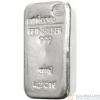The Benefits of Investing in Gold Bullion

Why Invest in Gold Bullion
Historical Value
Investing in gold bullion provides a unique opportunity to tap into its historical value. Gold has been considered a store of wealth for centuries, with its value often increasing during times of economic uncertainty. Its enduring appeal and limited supply make it a reliable investment option. Buying gold bullion allows investors to own a tangible asset that has stood the test of time.
Diversification
Diversification is one of the key reasons why investors choose to invest in gold bullion. Gold has a low correlation with other asset classes, such as stocks and bonds, making it an effective way to reduce overall portfolio risk. By including gold bullion in a diversified investment portfolio, investors can potentially mitigate the impact of market volatility and protect their wealth. Additionally, gold bullion can act as a hedge against inflation and currency fluctuations, providing a valuable source of stability in uncertain economic times. In fact, gold bullion has historically maintained its value over the long term, making it a reliable store of wealth. Furthermore, gold bullion can be easily bought and sold, with live metal price information readily available. This liquidity and transparency make gold bullion an attractive investment option for those looking to diversify their portfolios.
Inflation Hedge
Investing in gold bullion can serve as an inflation hedge. During times of inflation, the value of traditional currencies may decrease, but the value of gold tends to rise. This is because gold has a limited supply and is considered a store of value. By investing in gold bullion, investors can protect their wealth from the eroding effects of inflation. Additionally, gold bullion is a tangible asset that can be easily bought and sold, providing liquidity and flexibility for investors. It is important to note that when investing in gold bullion, it is advisable to purchase from reputable gold bullion dealers to ensure authenticity and quality.
How to Invest in Gold Bullion

Physical Gold
When investing in physical gold, there are a few important factors to consider. First, it is crucial to ensure the authenticity and quality of the gold. Look for reputable dealers that offer Swiss-made gold bars, known for their high purity and weight. Additionally, consider the storage and security of your gold. Transaction costs should also be taken into account. Overall, investing in physical gold provides a tangible asset that can act as a hedge against inflation and provide diversification in your investment portfolio.
Gold ETFs
Gold Exchange-Traded Funds (ETFs) are a popular way to invest in gold bullion. These funds are designed to track the price of gold and provide investors with exposure to the precious metal without the need to physically own and store it. Investing in gold ETFs can be a convenient and cost-effective way to gain exposure to the gold market. One advantage of gold ETFs is that they can be bought and sold on stock exchanges, making them highly liquid. However, it is important for investors to consider the management fees and expenses associated with these funds. Before buying gold ETFs, it is recommended to research the different options available and compare their performance and fees. It is also important to note that investing in gold ETFs does not provide the same level of security as owning physical gold bullion. Investors should carefully evaluate their risk tolerance and investment goals before deciding to invest in gold ETFs.
| Pros | Cons |
|---|---|
| Convenient and cost-effective | Lack of physical ownership |
| Highly liquid | Management fees and expenses |
Investing in gold ETFs can provide investors with exposure to the gold market without the need to physically own and store gold bullion.
Gold Mining Stocks
Gold mining stocks are another popular way to invest in gold bullion. These stocks represent shares in companies that mine and produce gold. Investing in gold mining stocks allows investors to gain exposure to the gold industry without directly owning physical gold. One advantage of investing in gold mining stocks is the potential for higher returns compared to investing in physical gold. However, it’s important to verify metal weight and the financial stability of the mining companies before investing. It’s also worth considering the risks associated with mining operations and market conditions. Overall, gold mining stocks can be a viable option for investors looking to diversify their portfolios and potentially benefit from the performance of the gold industry.
Factors to Consider When Investing in Gold Bullion

Market Conditions
Market conditions play a crucial role in gold bullion investments. The price of gold is influenced by various factors such as economic uncertainty, supply and demand dynamics, and global stock market trends. Investors need to closely monitor these conditions to make informed decisions. It is important to note that gold bullion is not the only option for investors looking to diversify their portfolios. Other precious metals like silver bullion can also serve as a valuable investment. However, it is essential to consider the market conditions and conduct thorough research before investing in any precious metal.
Storage and Security
When investing in gold bullion, it is crucial to consider the storage and security of your precious metal. One option is to keep the gold in a secure vault or safe deposit box. This ensures that your investment is protected from theft or damage. Another factor to consider is the reputation of the storage facility. It is important to choose a reputable and trustworthy storage provider to ensure the safety of your investment. Additionally, you should also consider the insurance options available for your gold bullion. Insurance provides an extra layer of protection in case of any unforeseen events. It is recommended to compare different storage options and choose the one that offers the best security measures and insurance coverage. Lastly, it is important to be aware of the transaction costs associated with storing and securing your gold bullion. These costs can vary depending on the storage provider and the amount of gold you have. It is advisable to research and compare the transaction costs of different storage facilities.
Transaction Costs
When investing in gold bullion, it is important to consider the transaction costs associated with buying and selling. These costs can vary depending on the method of investment chosen. For example, when purchasing physical gold, there may be additional costs such as shipping and insurance. On the other hand, investing in gold ETFs or gold mining stocks may have lower transaction costs. It is essential to research and compare the transaction costs of different investment options to ensure best value. Additionally, investors should also consider any fees or commissions charged by brokers or dealers. Overall, carefully evaluating transaction costs is crucial in maximizing returns and minimizing expenses.










